Contents
Oracle API Gateway provides powerful easy-to-use tools that enable you to develop, deploy, and manage API solutions. This section introduces each of the API Gateway tools:
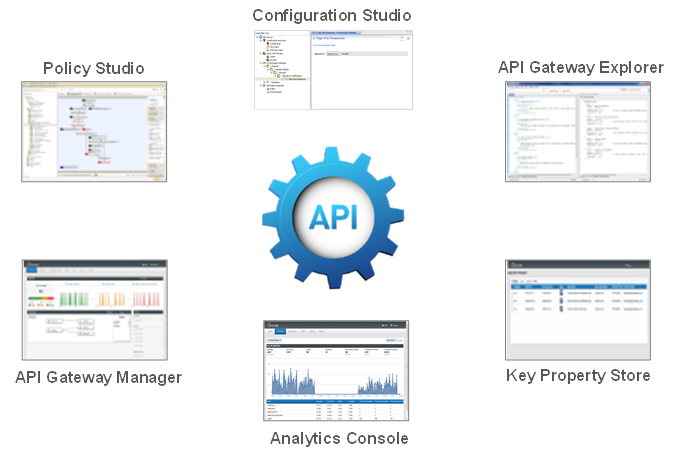
The central API Gateway core component is described as follows:
-
Provides the runtime environment for exposing virtualized APIs and executing policies
-
Implemented using combination of native code for performance and Java for extensibility
-
Deployed and managed in a distributed environment of multiple servers providing scalability and availability
-
Available in the following form factors:
-
Software—Windows, Linux, and Solaris
-
Virtual appliance—VMWare and Amazon Machine Image (AMI)
-
In enterprise organizations, the API Gateway is typically deployed in the DMZ between the public Internet and private intranet.
Policy Studio is graphical tool that enables you to virtualize APIs and develop policies (for example, to enforce security, compliance, and operational requirements). It includes the following features:
-
Flow-chart style visualization for easy development and maintenance
-
Graphical drag-n-drop user interface that enables you to drag filters (processing rules) on to the policy canvas and configure them
-
Extensive library of filters to build powerful policies
The following screenshot shows the policy canvas at the center and the filter library on the right:
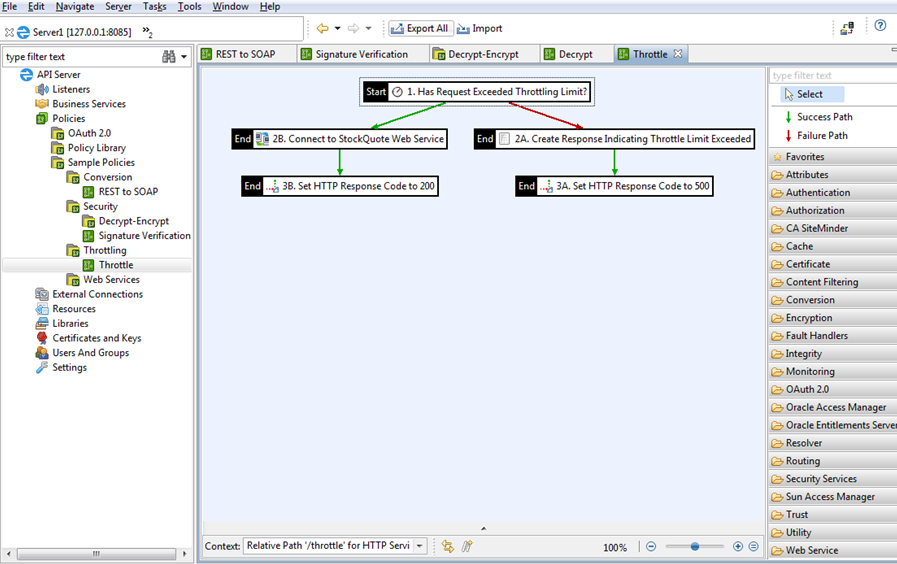
A filter is an executable rule that performs a specific type of processing on a message. For example, the Message Size filter rejects messages that are greater or less than a specified size. There are many categories of message filters available with the API Gateway (for example, Authentication, Authorization, Content Filtering, Conversion, Trust, and so on). In Policy Studio, a filter is displayed as a block of business logic that forms part of an execution flow known as a policy.
A policy is a network of filters in which each filter is a modular unit that processes a message. A message can traverse different paths through the policy, depending on which filters succeed or fail. For example, this enables you to configure policies that route messages that pass a Schema Validation filter to a back-end system, and route messages that pass a different Schema Validation filter to a different system. A policy can also contain other policies, which enables you to build modular reusable policies. In Policy Studio, the policy is displayed as a path through a set of filters, as shown in the previous example screen.
Oracle API Gateway Explorer is a graphical tool that enables you to test API performance, scalability, and security. For example, you can use API Gateway Explorer to send an example request message to a specific API service, and view the associated response.
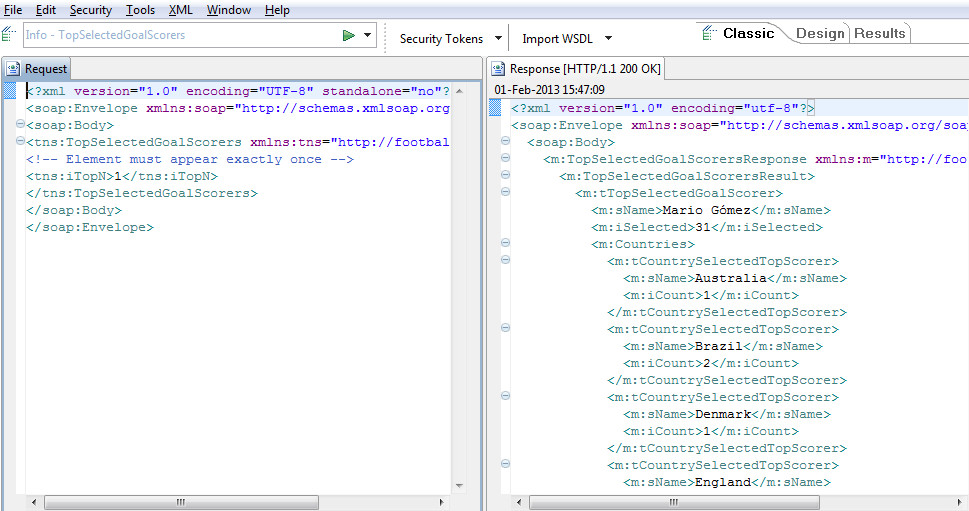
API Gateway Explorer includes the following features:
-
REST API and SOAP Web Services testing
-
Security token insertion (for example, WS-Security and SAML)
-
SOAP attachment management
-
Simplified certificate and key management
-
Test case creation and stress testing
Configuration Studio is a graphical tool used to promote API Gateway configuration from development environments to upstream environments (for example, testing or production). Configuration Studio enables API Gateway administrators to take configuration prepared by policy developers, and to create environment-specific configuration for deployment. Configuration Studio is designed for the skills of upstream administrators, and does not assume expertise in policy development and policy configuration.
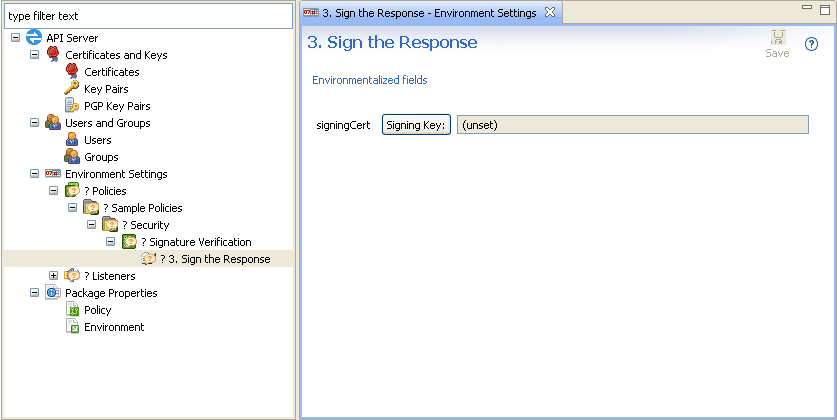
Configuration Studio enables administrators to perform tasks such as the following:
-
Open a policy package (
.pol) received from a development environment. -
Specify values for environment-specific settings selected in a development environment (for example, policy, listener, and external connections).
-
Import or create environment-specific certificates and keys.
-
Define environment-specific users and user groups.
-
Export the environment package to a file on disk. The environment package is implemented as an
.envfile.
API Gateway Manager is a Web-based administration console that enables you to perform operational monitoring, management, and troubleshooting.
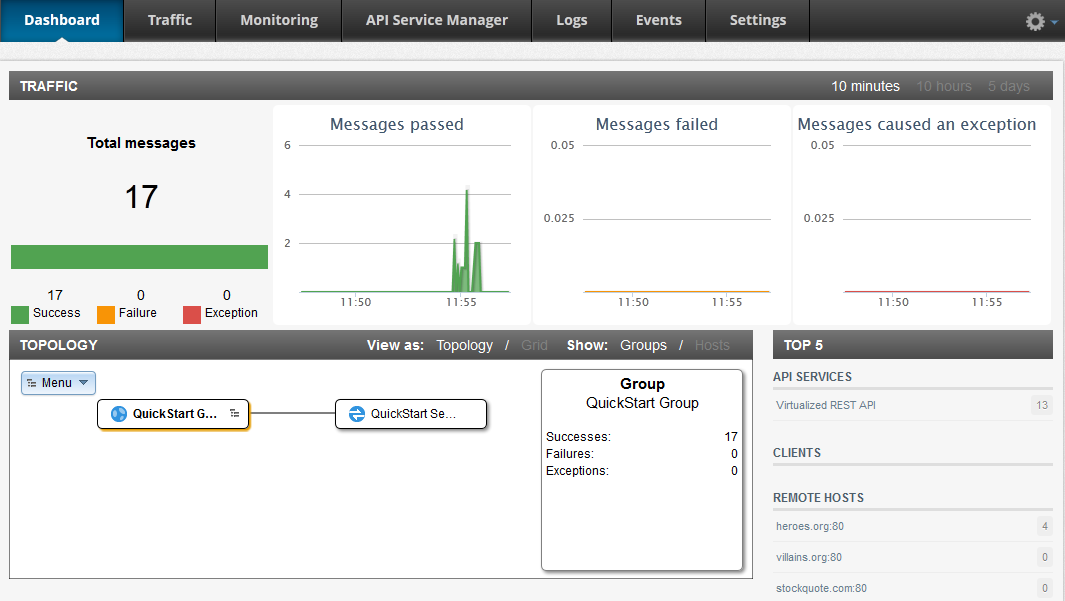
API Gateway Manager includes the following features:
-
Dashboard displaying the distributed topology with a real-time overview of message traffic by domain, group, and API Gateway
-
Real-time monitoring of message traffic and content, enabling easy identification of exceptions and drilling into message details
-
Real-time monitoring of performance metrics by API service, system, and remote host
-
Aggregated view of audit, alert, and SLA alert messages across the domain
-
Centralized viewing of audit and debug logs of each API Gateway instance
-
Managing dynamic system settings
-
Managing user roles assigned in the domain
API Gateway Analytics is a Web-based monitoring and reporting console that enables you to generate scheduled reports and analyze API use in multiple API Gateways across the domain.

API Gateway Analytics includes the following features:
-
Web-based console that monitors and reports on all API Gateways in the domain (multiple API Gateways are shown on the left in the diagram)
-
Reporting over an extended time period rather than immediate operational monitoring
-
Analysis of what APIs are used, how often APIs are used, when APIs are used, and who is using APIs
-
Scheduled reports in PDF format can be emailed to specific users
An Oracle Key Property Store (KPS) is used to store parameters that are dynamically passed into policies at runtime. This enables policy configuration data to be managed directly by business or operational users at runtime, and allows dynamic change of policy behavior.
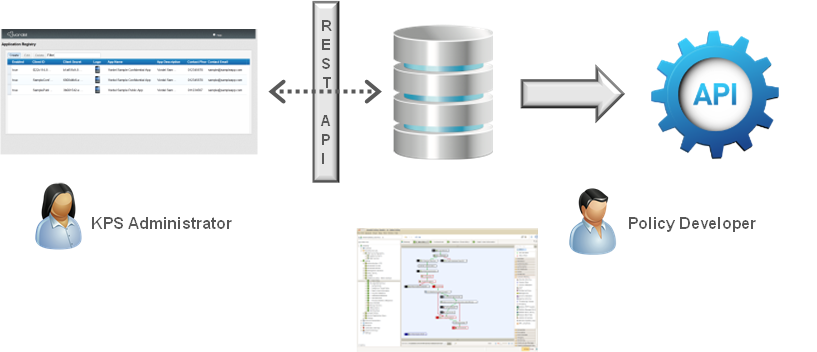
A KPS includes the following features:
-
Policies look up configuration data in the KPS at runtime to dynamically determine behavior
-
Policies developed in the Policy Studio use a selector syntax to specify context-sensitive lookup of policy configuration data at runtime from the KPS (for example,
${kps.CustomerProfiles[JoeBloggs].age}obtains the age of the specified customer) -
Provides a cached read-frequently, write occasionally cache with backing stores
-
Policy-specific UIs can be developed for business or operational users to manage the policy configuration data in the KPS

